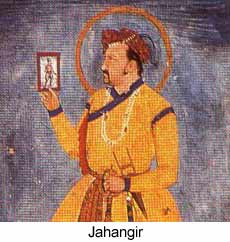

 |  |
 Jahangir (1569-1627) was the fourth Mughal emperor of India. During his reign, which lasted from 1605 until his death, he continued the expansion of the Mughal empire.
Jahangir (1569-1627) was the fourth Mughal emperor of India. During his reign, which lasted from 1605 until his death, he continued the expansion of the Mughal empire.
Jahangir was saved from a war of succession by the pre-decease of his brother and had only to deal with a short-lived revolt of his eldest son Khusrau. Jahangir was known as a patron of the arts. He was also known for his genuine sense of justice. This was marred by his outbursts of cruelty, and his dependence on drugs such as opium and alcohol. He could be genial one minute and violent the next. He was also criticized for giving way too often to his scheming Persian wife, Nur Jahan (Light of the World). His attachment to Nur Jahan was commemorated by a special issue of gold mohurs (coins). Jahangir was born in the palace city of Fatehpur Sikri, near Agra, in what is now the Indian state of Uttar Pradesh. His father was the Mughal emperor Akbar. Jahangir's father named him Muhammad Sultan Salim, but he took the title Jahangir (World-Conqueror) when he became emperor. In 1614, Jahangir captured the last great Rajput fortress of Rajasthan, and two years later he took over half the kingdom of Ahmadnagar on the Deccan Plateau. He granted trade concessions to the British in return for their naval support against the Portuguese. next page >> |
Copyright ©2000 indiansaga.info. All rights reserved.
By using this service, you accept that you won't copy or use the data given in this website for any commercial purpose.
The material on indiansaga.info is for informational & educational purpose only.
This site is best viewed at 800 X 600 picture resolution.